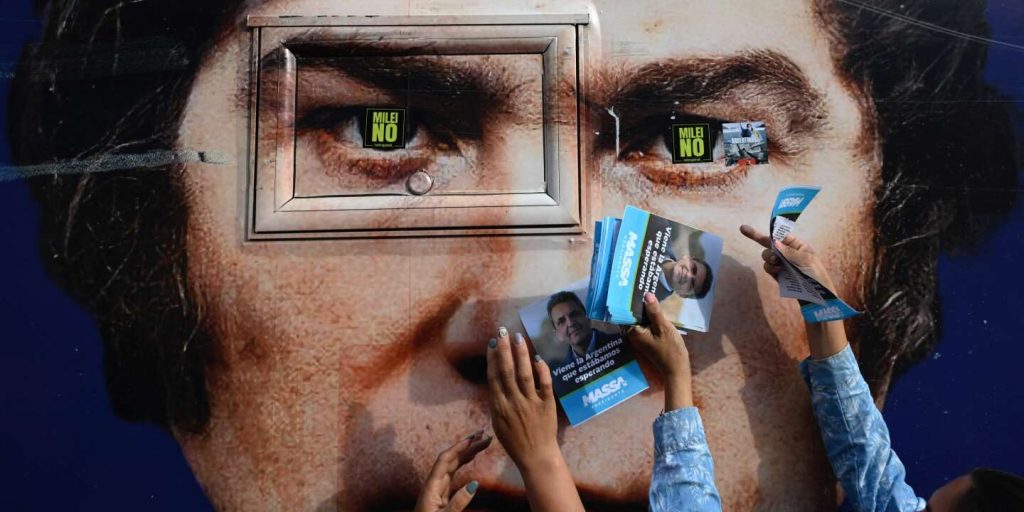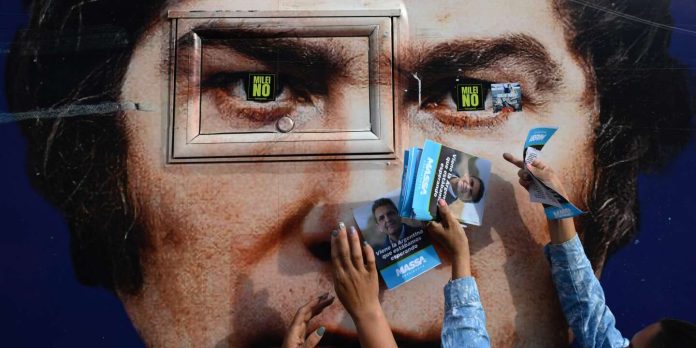“AI will probably lead to the end of the world, but in the meantime, there’ll be great companies.” –Sam Altman
Artificial Intelligence (AI), played a prominent role in Javier Milei’s presidential campaign in Argentina in the October 2023 elections. In the weeks leading up to the 22nd October election, Milei’s team shared an AI-generated image of Sergio Massa wearing a communist military uniform, which had 3 million social media views. Throughout the campaign, Milei and Massa’s teams used artificial intelligence to create images and videos that drew voters in and influenced public opinion .
A wide range of AI-generated content circulated on social media during the election. This content included satirical images that aimed to provoke emotional responses, as well as deceptive deepfakes that were designed to mislead voters. There are concerns surrounding the legal and regulatory frameworks surrounding political campaigns AI and disinformation .
Sergio Massa is depicted wearing a shirt decorated with military-style medals, making a gesture towards the blue sky. Around him, a group of elderly people in simple clothes, with serious and slightly altered expressions, look up at him with anticipation. This unique image, reminiscent of Soviet art, was created on purpose, based on specific instructions provided to the AI illustrator.
Media scholars emphasise the critical role of inclusive communication in fostering democratic engagement and safeguarding against the threats misinformation and disinformation pose to democracy . During the Argentine presidential elections, there was an effort to manipulate public opinion and stir up nationalist sentiments to promote a divisive political agenda. An example can be cited where Milei used an AI-generated photo on social media as a campaign tool, depicting Massa in a communist costume making a hand gesture belonging to another culture, aiming to rally the opposition’s voters by appealing to their sense of nationalism under the guise of unity and solidarity. The goal is undoubtedly to manipulate how the public perceives him.
The opposing party experienced a significant decline in voter support after AI-generated picture spread around, with decrease of around 14 million votes in the second round (See Image1,2). This proves how powerful AI is in the contemporary political era as it relates to shaping public perception.


The advent of AI in politics, showcasing a major shift from traditional campaign strategies in Argentina, has garnered global interest due to its tangible successes. United States (US) senators have already taken action to reduce AI’s possible misuse, which many speculate may happen in the future. The capacity of AI to determine the fate of a nation in a political election has not only captivated the entire world but also engendered a sense of threat among the upper echelons of political figures in the US.
AI could automate content creation, hyper-targeted voter outreach, and strategic data analysis, changing US political campaigning. Access to accurate information, misinformation, voter perception, and public distrust raise ethical concerns4. AI-powered political campaigns thrive in the US, with its diverse and proficient technology population. However, strict oversight is needed to prevent misuse and abuse.
So, what exactly is the likelihood that AI will influence and change the context of elections in the US ?
Generative AI poses a significant challenge as it operates discreetly, generating an overwhelming volume of content that has the potential to inundate media, the internet, and political discourse, with an abundance of meaningless or misleading information. Scholars explains this issue as, “For government officials, this undermines efforts to understand constituent sentiment, threatening the quality of democratic representation. For voters, it threatens efforts to monitor what elected officials do and the results of their actions, eroding democratic accountability .”
Furthermore, The Brennan Centre for Justice highlights the concerning impact of AI on elections, specifically the creation of deepfakes and the potential for AI-generated content to manipulate voter turnout and compromise election security. The impact of AI on elections extends beyond disinformation, encompassing the potential for bias in algorithmic decision-making processes concerning voter registration and mail ballot verification. Given the significant risks involved, it is crucial to thoroughly examine the impact of AI on elections .
AI in US elections could change campaign strategies and democracy. AI-powered data analysis customises voter messages, which may boost engagement. However, this practice raises valid privacy concerns. Bots and algorithms can spread inaccurate and misleading information to influence political discourse and voter decisions4. Deepfakes threaten media integrity and public trust, making content authenticity harder. AI can reduce cyberattacks and improve election security, but it also introduces new vulnerabilities. AI-powered political campaigns must rethink legal and ethical standards to ensure fairness, transparency, and accountability. AI could improve voter interaction, but it could also be seen as manipulative, eroding public trust and democratic engagement. This emphasises the need to balance technology in politics.
Disinformation technology threatens democracy, and the US appears to have recognized the threat and taken a proactive approach to addressing it. US senators have introduced a bipartisan bill to ban materially deceptive AI-generated audio, images, or video in political or issue ads for federal candidates. The US Federal Election Commission also wants to regulate AI-generated deepfakes in political ads to protect voters before the presidential election.
American stakeholders must be cautious about technological advances to improve democratic engagement. Argentina’s controversial AI use can teach them valuable lessons. This delicate balance will affect the 2024 US elections and digital political campaigning.
The impact of AI tools extend beyond merely influencing the 2024 elections; it poses a significant threat to the process of democratization in every future global election. This will pave the way for speculation that distorts public perception, dealing a serious blow to democracies. Particularly, right-leaning authoritarian parties will likely exploit this to their advantage, basing their politics on fear and misinformation campaigns against opposition parties and institutions that do not support their ideology. Despite having played an active role for only a year, the detrimental effects on these entities are clearly evident.
If you like our content, join us in helping to bring reality and decency back by SUBSCRIBING to our Youtube channel: https://www.youtube.com/channel/UCQ1Ll1ylCg8U19AhNl-NoTg AND SUPPORTING US where you can: Award Winning Independent Citizen Media Needs Your Help. PLEASE SUPPORT US FOR JUST £2 A MONTH https://dorseteye.com/donate/







